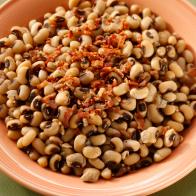What Are Postbiotics?
Here’s what you need to know about the latest gut health term.

Tanja Ivanova/Getty Images
You may have heard of prebiotics and probiotics, but there’s a new gut health term on the block called postbiotics. Though nonliving, these bacteria can offer health benefits. Here’s an introduction to postbiotics, what they can do for you and where you can find them.
What Is a Postbiotic?
According to the International Scientific Association for Probiotics and Prebiotics (ISAPP), a postbiotic describes dead or nonliving bacteria that provide health benefits when taken. There are general categories to what can make up a postbiotic. They include nonliving bacteria, and/or parts of the cell structures, with or without metabolites. According to Amanda Sauceda, MS, RD, and gut health dietitian, postbiotics are “similar to probiotics in the sense that it must provide a health benefit.” With probiotics, the bacteria are live and provide a health benefit. If dead bacteria provide a health benefit, they are then categorized as postbiotic.
Some postbiotics are byproducts or metabolites produced by probiotics during their active phase. For example, probiotics fermenting dietary fiber produce short-chain fatty acids like butyrate or acetate. Both provide energy to cells in the colon and are anti-inflammatory. You can also have postbiotics that are from a microbial cell fragment or structure — meaning just part of the dead bacteria.
What Are the Health Benefits of Postbiotics?
The world of postbiotics is relatively new. This 2022 published paper on postbiotics and their potential health benefits discusses increased immunity, reduced digestive symptoms including helping to decrease symptoms in people with irritable bowel syndrome and inflammatory bowel disease, and potentially helping people with food allergies. Evidence was found that a strain of bacteria that produces butyrate may help with a quicker remission in someone allergic to cow’s milk.
However, Sauceda says research on postbiotics gets tricky because “a standard postbiotic definition hasn’t been used across the research.” Sauceda explains that one of the most popular metabolites produced by gut bacteria is butyrate, but its categorization as a postbiotic isn’t agreed upon by everyone. Research has shown that butyrate has been found to be helpful in maintaining the intestinal barrier. It has also been looked at for helping to reduce inflammation in the gut.
Additionally, there is research examining the role of postbiotics in mood disorders like depression. Sauceda points out, “There have been studies looking at postbiotics potentially affecting depression in mice and helpful for reducing anxiety in a small study with humans.”
Postbiotics may also be helpful when it comes to children’s health. “It’s thought postbiotics could be a safer alternative than probiotics because the bacteria is no longer living. In fact, research has looked at postbiotics in infant formula and the role it might play in digestive health but there is still a lot of unknown in regards to efficacy,” Sauceda explains.
Where Can You Find Postbiotics in Food?
Postbiotics are not found in food. According to Sarah Schlichter, MPH, RDN, writer, podcast host and media dietitian at Bucket List Tummy, most folks should start by eating prebiotic- and probiotic-rich foods from the diet rather than jumping straight to a postbiotic supplement. This is because these foods will “lead to increased postbiotic production, and provide other beneficial nutritious compounds, like vitamins, minerals and fiber.” You can find prebiotics in foods like oats, beans, apples, bananas and onions, and probiotics in fermented foods, such as yogurt, sauerkraut, tempeh, miso, kefir and kimchi.
Sauceda also says, “While there was research that described finding postbiotics in fermented foods the researchers also detail that the amount produced wouldn’t be enough to actually have a health benefit.”
Should You Take a Postbiotic Supplement?
Schlichter says that postbiotic supplements may not be for everyone, including folks with digestive disorders or discomfort, pregnant people and those with certain chronic conditions. “It's important to remember that there is rarely a one-size-fits-all recommendation, especially when it comes to supplementation, and we need more research about the true efficacy of supplements.”
Further, supplements aren’t regulated by the U.S. Food & Drug Administration (FDA), and not all supplements contain the amounts they claim, especially if they haven’t been third party-tested. “Most people should aim to get sufficient probiotic-rich foods in their diets to aid in the production of postbiotics,” explains Schlichter. “If someone’s diet is lacking in prebiotic and probiotic foods, talking to a medical professional about a third-party tested supplement may be an option to get some of these health benefits you may be missing out on.”
Schlichter mentions taking a probiotic supplement can help with postbiotic production.
If you decide to take a postbiotic supplement, like butyrate, Schlicter likes Garden of Life Pre+Pro+Postbiotic Supplement because all three types of the bacteria work together in the body. The supplement provides 16 different probiotic strains and is third party-certified.
Always consult your medical doctor before choosing to take any gut health supplement.
Related Content:





























